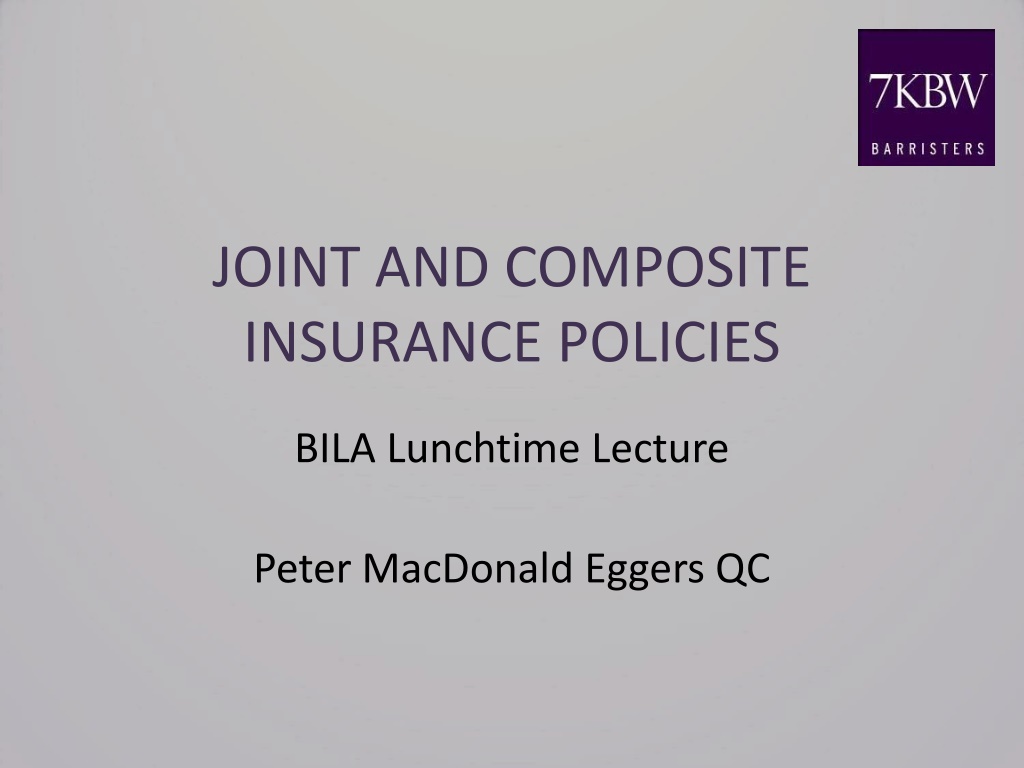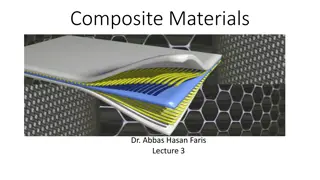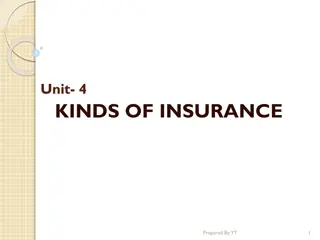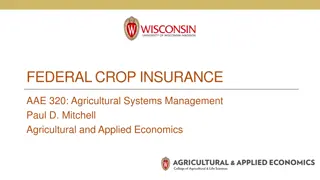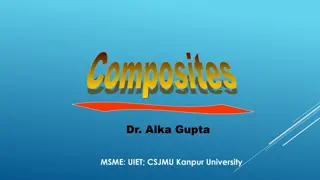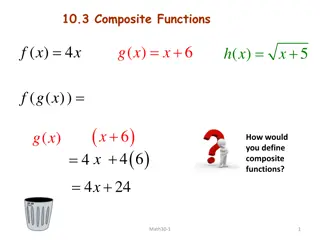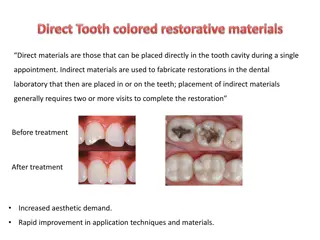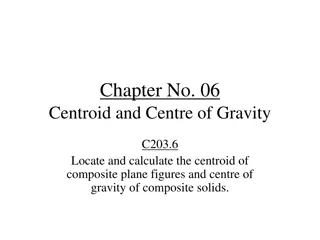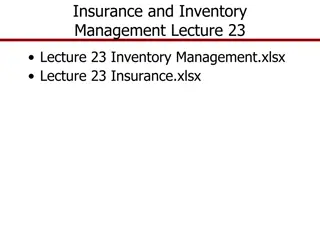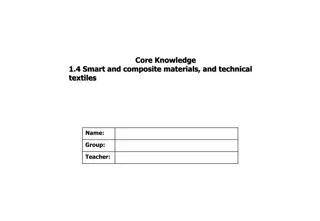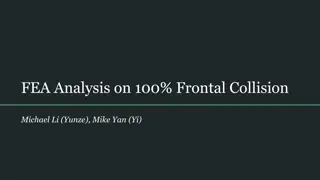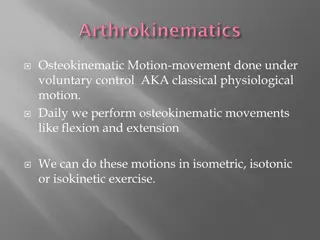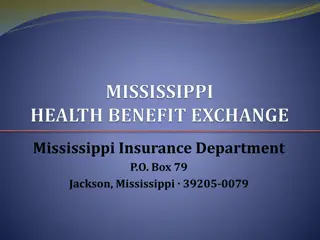Exploring Joint and Composite Insurance Policies
Dive into the world of joint and composite insurance policies, covering topics such as the composite nature of insurance, handling multiple insurers and assureds, the implications of late payment of claims, and the distinctive features of joint policies. Understand the complexities and nuances of insuring multiple subject matters, the impact on remedies in case of breach, and the legal implications for insurers and assureds in these unique insurance structures.
Download Presentation

Please find below an Image/Link to download the presentation.
The content on the website is provided AS IS for your information and personal use only. It may not be sold, licensed, or shared on other websites without obtaining consent from the author. Download presentation by click this link. If you encounter any issues during the download, it is possible that the publisher has removed the file from their server.
E N D
Presentation Transcript
JOINT AND COMPOSITE INSURANCE POLICIES BILA Lunchtime Lecture Peter MacDonald Eggers QC
Topics Composite nature of insurance Multiple insurers/assureds Joint policies Composite policies The number of insurance contracts Impact on: Remedies for breach of duty of fair presentation Wilful misconduct Fraudulent claims Subrogation Late payment of insurance claims 2
The composite nature of insurance Classic insurance policy: One party insures one subject-matter with one insurer It is possible for one policy: To insure multiple subject-matters To be subscribed by multiple insurers To insure multiple assureds Multiple subject-matters: Combined property policy Fleet policy: numerous vessels insured under one policy at one time: Common provision: Each vessel deemed to be a separate insurance Numerous subject-matters (e.g. consignments, ships) insured in progression: Floating policies Open covers Reinsurance treaties Umbrella policies Stock policies 3
Multiple insurers Sect. 24(2) of the Marine Insurance Act 1906: Where a policy is subscribed by or on behalf of two or more insurers, each subscription, unless the contrary be expressed, constitutes a distinct contract with the assured Bundle of contracts: Ionides v Pacific Fire and Marine Insurance Co (1872) General Reinsurance Corp v Forsakringsaktiebolaget Fennia Patria (1983) The Zephyr (1984) Consequences: Each underwriter is bound on signature Duty of disclosure concludes on making of contract Different defences potentially available to each underwriter Subject to leading insurer clause 4
Multiple assureds Assureds may be insured in a number of different ways: Named as an assured Included within a described class Undisclosed principal National Oilwell (UK) Ltd v Davy Offshore Ltd (1993) O Kane v Jones (2003) Talbot Underwriting Ltd v Nausch Hogan & Murray (2006) Generally, an assured is a party to the insurance contract 5
Joint and composite insurance Joint policies Two or more assureds, whose interests are inseparably connected so that a loss or gain necessarily affects all of the co-assureds in the same way and to the same extent General Accident Fire & Life Assurance Corp Ltd v Midland Bank Ltd (1940) Example: Joint tenants of property Direct Line Insurance plc v Khan (2001) Compare partnerships and corporate groups: Brit Syndicates Ltd v Grant Thornton International (2008) HLB Kidsons v Lloyd s Underwriters (2008) Just because a policy describes the assured as joint does not mean it is a joint insurance Parker v National Farmers Union Mutual Insurance Society Ltd (2012) 6
Joint and composite insurance Composite policies Two or more assureds whose interests are distinct Examples: owners and bailees of property owners and mortgagees of property landlords and tenants owners and charterers of a ship owners, contractors and sub-contractors of property under construction Samuel & Company Limited v Dumas (1924) Tomlinson (Hauliers) Ltd v Hepburn (1966) New World Harbourview Hotel Co Ltd v Ace Insurance Ltd (2012) (HKCFA) Parker v National Farmers Union Mutual Insurance Society Ltd (2012) 7
Joint and composite insurance Composite policies (pervasive interests) The interests insured are distinct but are such that any one assured may recover completely for a loss Petrofina (UK) Ltd v Magnaload Ltd (1983) The State of the Netherlands v Youell (1997) Cape Distribution Limited v Cape Intermediate Holdings Plc (2016) 8
Joint and composite insurance Number of contracts: Joint insurance: one policy = one contract Composite insurance: each assured is a party to a separate contract Samuel & Company Limited v Dumas (1924) General Accident Fire & Life Assurance Corp Ltd v Midland Bank Ltd (1940) New Hampshire Insurance Company v MGN Ltd (1997) Arab Bank plc v Zurich Insurance Co (1999) Parker v National Farmers Union Mutual Insurance Society Ltd (2012) Note distinction in use of terms policy and contract : Sect. 17-20 of Marine Insurance Act 1906 Cf. sect. 53 of Marine Insurance Act 1906 Eide UK Ltd v Lowndes Lambert Group Ltd (1999) 9
Duty of fair presentation Sect. 3(1) of Insurance Act 2015: Before a contract of insurance is entered into, the insured must make to the insurer a fair presentation of the risk Sect. 18 of Marine Insurance Act 1906: the assured must disclose to the insurer, before the contract is concluded, every material circumstance which is known to the assured Joint policies: a non-disclosure by one assured will affect the joint assured New Hampshire Insurance Company v MGN Ltd (1997) Direct Line Insurance plc v Khan (2001) 10
Duty of fair presentation Composite policies Each co-assured is subject to an independent duty of disclosure A non-disclosure by one assured is not necessarily attributed to a co-assured The remedy of avoidance relates to the contract which is procured by the breach of duty of disclosure New Hampshire Insurance Company v MGN Ltd (1997) Arab Bank plc v Zurich Insurance Co (1999) Other remedies under Sched. 1 of Insurance Act 2015 depends on extent of inducement of insurer to enter into the contract 11
Wilful misconduct Under a composite policy, the wilful misconduct of one co-assured will not taint an innocent co-assured: Samuel & Company Limited v Dumas (1924) The State of the Netherlands v Youell (1997) Parker v National Farmers Union Mutual Insurance Society Ltd (2012) Under a joint policy, the wilful misconduct of one co- assured will taint an innocent co-assured: Samuel & Company Limited v Dumas (1924) 12
Fraudulent claim Composite insurance: A fraudulent claim by one co-assured will not necessarily afford a remedy to the insurer against another co-assured Parker v National Farmers Union Mutual Insurance Society Ltd (2012) Prior to the Insurance Act 2015: Forfeiture of benefit Avoidance of contract under sect. 17 of Marine Insurance Act 1906 Under sect. 12 of the Insurance Act 2015: No liability for claim Right of termination of contract from date of fraudulent act Cf. sect. 13 of the Insurance Act 2015: Applies where insurance contract with A for benefit of others who are not parties to the contract Where one of the beneficiaries is fraudulent, the insurer s rights under sect. 12 may be exercised only against the fraudulent beneficiary 13
Fraudulent claim Joint insurance: Position is unclear On one hand, the fraud may taint the innocent co-assured On the other hand, the fraud may create only a personal disability Samuel & Company Limited v Dumas (1924) 14
Subrogation Upon payment of an insurance claim, the insurer is subrogated to the insured s rights of action against third parties Sect. 79 of Marine Insurance Act 1906 If the third party is a co-assured, what are the insurer s rights of subrogation? Depends on terms of any underlying contract between the co-assureds Requirement to take out joint insurance may indicate intention to look to the insurance first Depends on the terms of the insurance policy If the co-assured is entitled to cover for the loss, the insurer has no right of subrogation If the co-assured is not entitled to cover for the loss, the insurer has a right of subrogation The Court may imply a term which does not follow this pattern Authorities: National Oilwell (UK) Ltd v Davy Offshore Ltd (1993) Board ofTrustees of the Tate Gallery v Duffy Construction Ltd (2007) Tyco Fire & Integrated Solutions (UK) Ltd v Rolls-Royce Motor Cars Ltd (2008) Rathbone Brothers plc v Novae Corporate Underwriting (2014) Gard Marine & Energy Ltd v China National Chartering Co Ltd (2015) (CA) Cape Distribution Limited v Cape Intermediate Holdings Plc (2016) Cf. insurer s right of salvage: The WD Fairway (2009) 15
Late payment of insurance claims Sect. 13A of Insurance Act 2015: Implied term that insurer must pay insurance claim within reasonable time (allowing for investigation and assessment of the claim) If the insurer shows there are reasonable grounds for disputing the claim, there is no breach while the dispute is continuing If there is a breach, the insured will have remedies (e.g. damages) in addition to the payment of the claim and interest Multiple insurers: Difficulties might arise where: Some members of a subscription market act unreasonably and others don t Do the insurers in breach have to bear the entirety of the loss or only a proportion of it? Multiple assureds: Difficulties might arise where: One defence is reasonable against one assured but not another assured One assured is paid on time but another assured is not paid on time Each assured has different losses The exercise of the insurers rights of subrogation against co-assureds 16
Conclusion Identify the relevant assureds Identify the nature of the insurance contract Identify the parties to each separate contract Identify the relationship between the parties Apply legal principles to the separate contracts and the inter-party relationships Non-disclosure Wilful misconduct Fraudulent claim Subrogation Late payment of insurance claims Is there a case for treating joint policies differently from composite policies? 17
www.7kbw.co.uk 7 King s Bench Walk, Temple, London EC4Y 7DS +44 20 7910 8300
